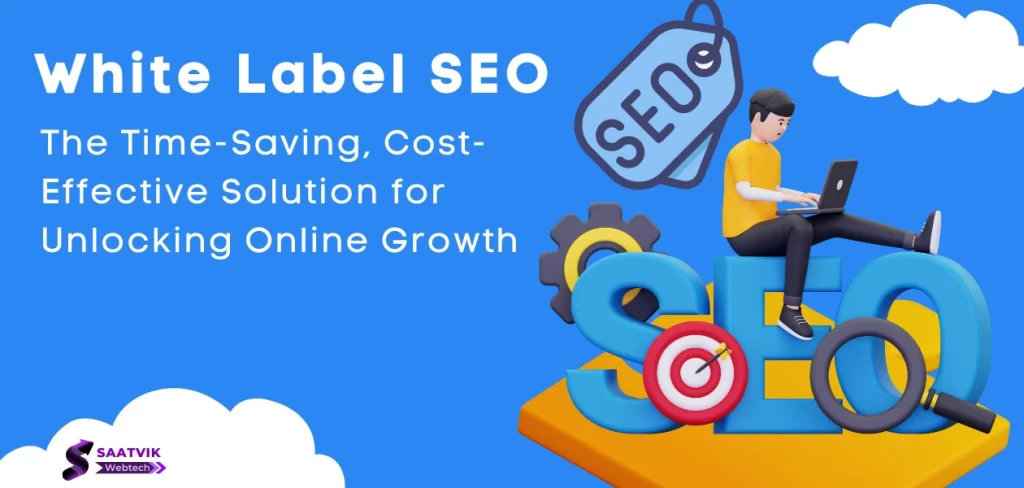Navigating the complex world of SEO can feel overwhelming. Especially when resources are limited.But what if there was a simpler way?A method that saves both time and money while delivering top-notch results? Enter white-label SEO. In this guide, we’ll dive into how outsourcing SEO can be the game-changer you need. Get ready for tips and strategies to turbocharge your marketing.
Tired of turning away potential clients because you can’t offer SEO? Frustrated by watching your competitors outrank you, even though you know your services are superior? White-label SEO could be the missing piece of your agency’s growth puzzle.
White-label SEO allows businesses and agencies to:
- Expand service offerings without hiring and training a full SEO team.
- Boost online visibility and improve search rankings.
- Achieve sustainable online growth without the time-consuming management of SEO strategies.
- Tap into specialized expertise even if in-house knowledge is limited.
- Save money compared to building an internal team from scratch.
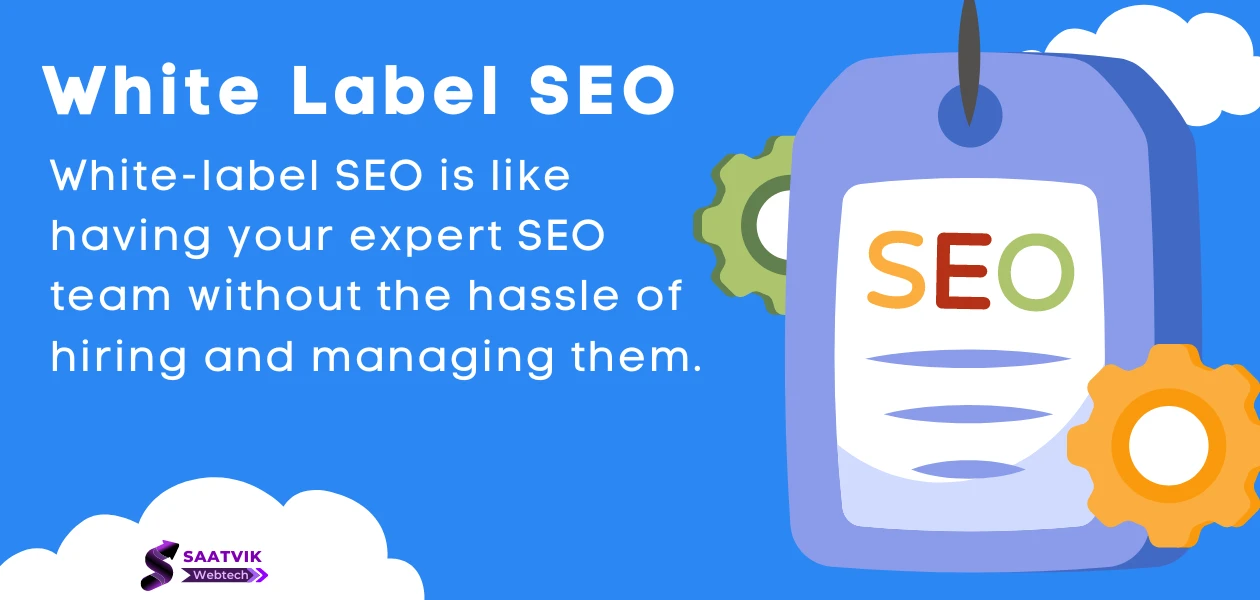 Definition of White Label SEO
Definition of White Label SEO
White-label SEO is like having your own expert SEO team without the hassle of hiring and managing them. It’s a partnership where a specialized SEO agency does the groundwork, providing you with services to offer your clients under your brand. Think of it as a secret weapon that boosts your marketing arsenal!
importance of SEO in Digital Marketing
In today’s crowded online world, SEO (search engine optimization) is the difference between your clients being found and being lost in the digital wilderness. Here’s why it matters:
- Organic Visibility: Good SEO helps your clients’ websites rank higher in search results like Google, leading to more clicks and potential customers without paying for each click.
- Trust and Credibility: High search rankings signal to potential customers that a business is relevant and trustworthy.
- Targeted Traffic: SEO focuses on keywords their ideal customers are already searching for, bringing in the right kind of visitors.
- Long-term ROI: Unlike paid ads that stop working the moment you stop paying, SEO builds lasting online authority.
Understanding white-label SEO
Let’s break down the mysteries of white-label SEO and how it can supercharge your digital marketing strategy.
What Is White Label SEO and How Does It Work?
Think of white-label SEO like hiring a team of SEO ninjas who work under your brand’s banner. Here’s how it operates:
- **You Partner with a Specialized SEO Provider:** You find a reputable agency specializing in white label SEO services.
- **They Do the Heavy Lifting:** Your white-label partner handles all the SEO work, from keyword research and website optimization to link building and reporting.
- **You Present Results to Your Clients:** They deliver the SEO results to you, branded entirely as your own work. Your clients see your agency as the SEO experts without knowing you have a secret weapon!
How It Differs From Traditional SEO
Here’s where white-label SEO stands apart from doing it all yourself:
- In-House SEO:You have a dedicated SEO team, managing all aspects of SEO for your clients. This requires time, resources, and ongoing training.
- White-label SEO:You gain the benefits of a skilled SEO team without needing to hire, train, and manage them yourself.
Who Handles What in the White Label SEO Relationship?
- You (The Agency):
- Client relationship management
- Setting expectations
- Sales and marketing of SEO services
- Presenting white-labeled results and reports
- Your White Label Partner:
- Executing SEO strategies
- Comprehensive keyword research
- On-page and off-page optimization
- Technical SEO fixes
- Detailed, white-labeled reports
Why Should You Use White Label SEO Services?
White-label SEO isn’t for everyone, but consider these compelling reasons:
- Save Time & Money:Skip the costly process of building an SEO team from scratch.
- Access Experts:Tap into specialized SEO knowledge without the hefty salaries.
- Scale Quickly: Handle more clients and offer SEO services without needing to expand your team.
- Focus on Your Strengths: Let the SEO wizards do their thing while you focus on client relationships and growing your business.
Who needs white-label SEO?
Not every business or agency has the resources or need for a full-fledged, in-house SEO team. That’s where white-label SEO shines. Here’s a breakdown of who benefits most:
1. Agencies Without an SEO Team
- The Challenge: You’re rocking web design, social media, or PPC, but clients increasingly ask about SEO. You don’t want to turn away business, but building an SEO team from scratch is costly and time-consuming.
- White Label to the Rescue: A reputable white label SEO partner becomes your “behind-the-scenes” SEO department. You offer these services to clients, expanding your reach without the hefty investment in hiring and training.
2. Companies Looking to Scale Quickly
- The Challenge: You’re expanding rapidly—new markets, new product lines. You need to ramp up your online visibility FAST, but your internal team is already stretched thin.
- White Label to the Rescue: A white label provider takes the SEO workload off your plate. They have the manpower and expertise to tailor campaigns to your new target markets, ensuring you hit the ground running.
3. Businesses Needing Expert SEO Help
- The Challenge: Maybe you’ve tried DIY SEO with mixed results or have an in-house person who is more of a generalist. For complex websites, competitive industries, or local SEO, you need specialized knowledge.
- White Label to the Rescue: White label providers often have deep expertise in specific niches. This translates to better results: they know the unique ranking factors and audience behaviors for your industry, delivering a greater ROI.
Additional Considerations
- Freelancers: White label SEO can help you take on larger client projects by offloading some specialized aspects like technical SEO or link building.
- In-House Teams Overwhelmed: Even companies with SEO teams sometimes use white label support to handle peak periods, specialized campaigns, or to get a fresh perspective.
Remember, a good white-label SEO partner isn’t just an “outsourcer.”. They should feel like an extension of your team, invested in your clients’ success!
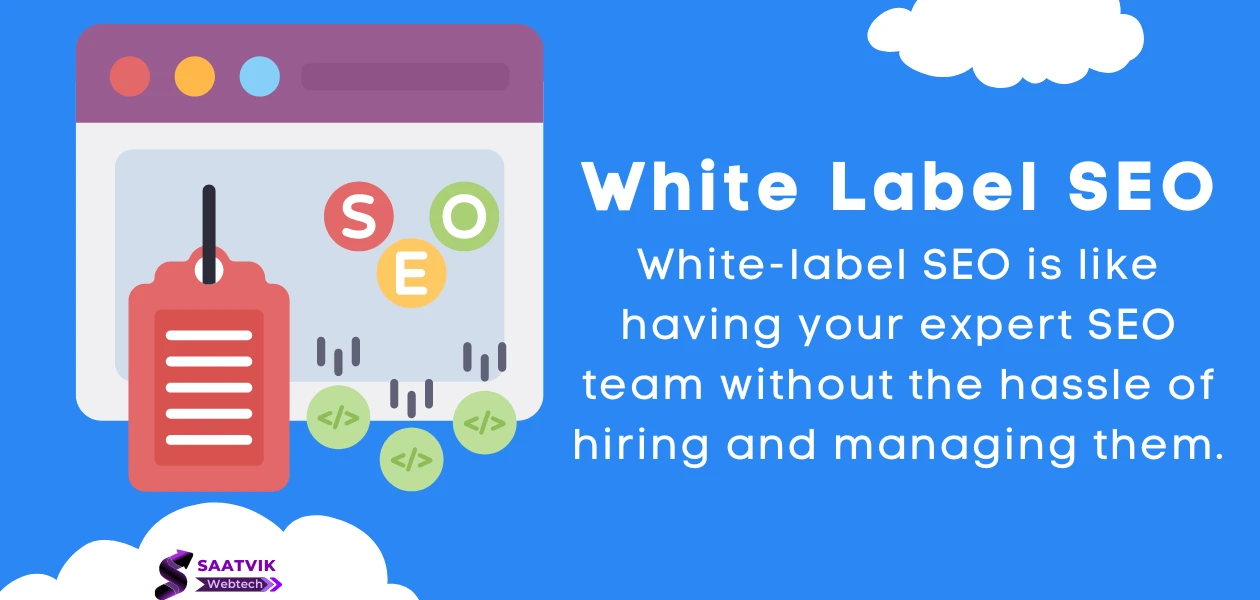 Benefits of White Label SEO
Benefits of White Label SEO
White label SEO isn’t just a fancy term; it offers a wealth of tangible benefits that can transform your business, whether you’re a struggling agency or a company looking to boost your online presence. Let’s dive in:
- Cost-effective: Building an in-house SEO team is expensive. You need specialized talent, tools, and ongoing training. White-label SEO eliminates these costs, allowing you to offer top-notch SEO services without the overhead. You pay for results, not salaries.
- Scalability: Do you suddenly need to ramp up your SEO efforts? With white label, you can. Your partner can seamlessly handle increased workloads, letting you scale up (or down) as needed without the hassle of hiring and firing.
- Access to Expertise and Knowledge: White-label partners are SEO specialists. They live and breathe search engine algorithms, best practices, and the latest trends. This deep knowledge translates directly into better results for your clients.
- Undiluted Focus: Let’s face it, running a business or agency is hectic. White-label SEO takes that significant task off your plate, freeing up your time and mental energy to focus on what you do best.
- Focus on Core Business Functions: Whether you’re selling marketing services or running a bakery, SEO is likely a supporting element for your business, not its core. Outsourcing lets you direct resources and attention to the heart of your operations.
- Branding Opportunities: This is the beauty of white label! The SEO work is done under your brand. Your clients see you as an SEO expert, strengthening your reputation and client relationships.
In Summary
White-label SEO isn’t about cutting corners; it’s about working smarter. You gain cost savings, flexibility, access to specialized expertise, and the ability to protect your time and brand reputation. If you’re looking for a way to boost your bottom line and offer unparalleled value, white-label SEO should be at the top of your exploration list.
Key Services Included in White Label SEO
White-label SEO providers cover a wide array of services to make your website a powerhouse within search engines. Let’s dive into the essentials:
Keyword Research: The Search-Term Strategy
- Identifying Target Terms: This is the foundation! A good provider will analyze your niche, your competitors, and what phrases your ideal customers are actually typing into search engines.
- Balancing Search Volume and Difficulty: The goal here is to find terms with decent search volume each month (people are using them) but aren’t so competitive that it’s impossible to rank for them.
- Long-Tail and Informational Keywords: These are more specific phrases that often signal strong purchase intent, like “best affordable wireless headphones 2024”.
On-Page SEO: Optimizing Your Pages
- Title Tags and Meta Descriptions: These are the snippets people see on Google results. Your provider will make sure they’re compelling and include your target keywords.
- Header Structure (H1, H2, etc.): This helps search engines understand the hierarchy of your content. Good white-label partners will optimize this for readability and keyword placement.
- Image Optimization: This includes using relevant file names, descriptive ‘alt text’ tags, and compressing images for faster loading.
Off-Page SEO: Building Your Reputation
- Link Building: Getting high-quality websites to link back to yours is like a “vote of confidence” for Google. White-label providers may use strategies like guest posting, content outreach, and directories.
- Local SEO: This is critical if you serve a specific area. It involves things like optimizing your Google My Business profile and getting listed on local directories.
Technical SEO: Fixing What’s Under the Hood
- Website Speed: Slow load times hurt rankings. Your partner will assess this and provide recommendations.
- Mobile-Friendliness: Google prioritizes sites that look great on phones. Testing and optimization are key.
- Crawlability and Indexation: This is about making sure search engines can easily ‘read’ your site and include it in their results.
Content Creation and Optimization: Words that Win
- Blog Posts and Articles: High-quality, informative content keeps users engaged and builds authority. Your provider can create content based on your keywords.
- Existing Content Updates: Sometimes your older content just needs refreshing with up-to-date information and better keyword targeting.
Reporting and Analysis: Tracking What Matters
- Rankings Reports: Tracking your positions in search for your target keywords.
- Website Traffic Analytics: Seeing where visitors come from, what they’re interested in, and areas needing improvement.
- Regular Insights: A top-tier provider won’t just send data; they’ll actively interpret it and suggest changes to your strategy.
Important Note: Not all white-label SEO providers offer every single one of these services. It’s crucial to ask about their specific areas of expertise to meet your clients’ needs.
Choosing the Right White Label SEO Partner
Choosing the right white label SEO partner feels a bit like finding the missing piece to your agency’s puzzle. An ideal partner will seamlessly integrate with your team, elevate your service offerings, and drive results for your clients. Here’s what to prioritize during your search: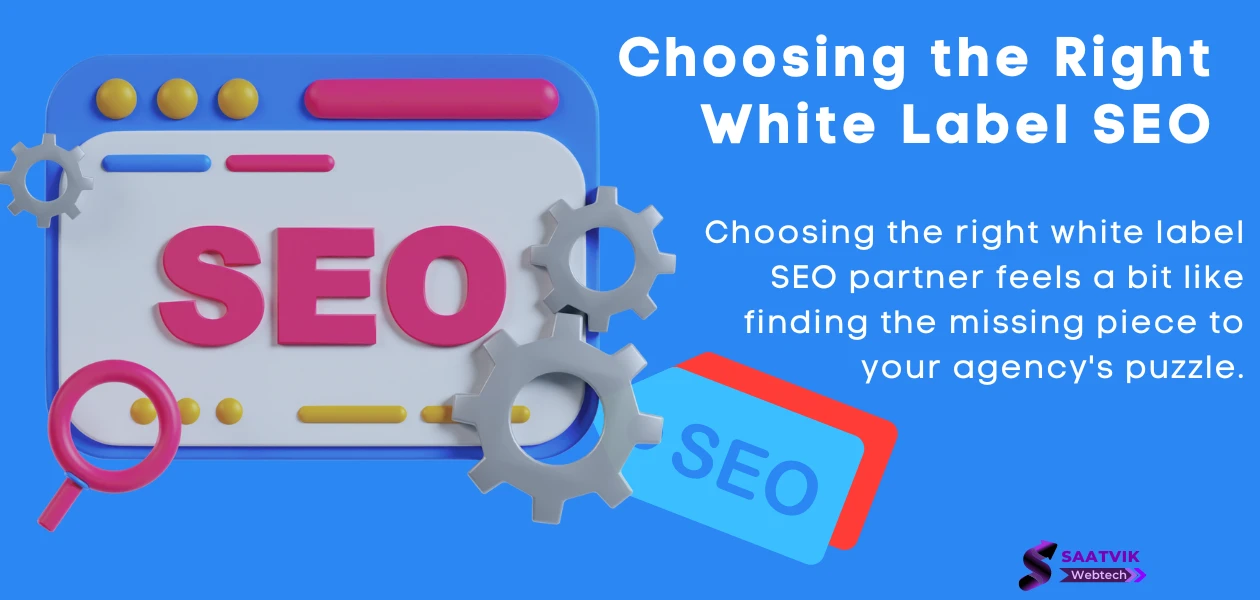
Expertise and Experience
- Proven Track Record: Look for case studies, testimonials, or even rankings for keywords relevant to your niche. This is tangible evidence of their success.
- Specializations: Do they excel in technical SEO for complex websites, or are they content marketing gurus? Ideally, their strengths align with your most common client needs.
- Years in Operation: While newer providers can offer fresh ideas, an established company demonstrates stability and a well-honed process.
Communication and Reporting
- Clear Processes: How often will they provide updates, and in what format (calls, emails, through a project management tool)?
- Transparency: Do their reports clearly explain completed work, results achieved, and the plan for the next period? Avoid agencies that use vague language or focus solely on vanity metrics.
- Responsiveness: Test this early on! How quickly do they answer your initial questions? This sets the tone for future collaboration.
Scalability and Flexibility
- Growth Potential: Can they support you as you take on more clients or expand service offerings? Inquire about their capacity to handle fluctuations in workload.
- Adaptability: Can they tailor their approach to match your various clients’ needs or are they rigid in their methods?
Pricing Models
- Cost Structure: Do they charge by project, hourly, or via a monthly retainer? Understanding this upfront ensures compatibility with your own client billing structure.
- Transparent Pricing: Request a clear breakdown of what’s included in their packages and what might incur additional fees.
- Value over Price: Remember, cheapest isn’t always best. Focus on the long-term return on investment rather than just getting the lowest rate.
Beyond the Checklist: Building a Strong Partnership
The best white-label relationships go beyond ticking boxes. Here’s how to create a collaborative and successful partnership:
- Treat them as an extension of your team. Share your company culture, branding guidelines, and client communication style. This fosters a seamless client experience.
- Honesty and Openness: Communicate client goals clearly and proactively address any concerns.
- Invest in the relationship: Take the time for regular check-ins, provide feedback, and show appreciation for good work.
By carefully considering these factors, you’ll find a white-label SEO partner who elevates your agency, builds trust with clients, and contributes to your long-term success.
How to Choose a Good White-Label SEO Provider
Finding the right white-label SEO partner is crucial to the success of your campaigns and client relationships. It’s not just about the price; you’re investing in expertise and a partnership. Here’s what to look for:
1. Reputation Check: Start with the Basics
- Reviews and Testimonials: Search for testimonials on the provider’s website and reviews on third-party platforms. Real clients giving positive feedback are a great sign of quality and reliability.
- Case Studies: See if they have detailed case studies that show how they tackled challenges and delivered successful results for other clients. This gives you insight into their strategies and problem-solving approach.
2. Dig Deeper: Assess Their Capabilities
- A Ranking Website: Do they have their own website that ranks well in search results? If an SEO provider can’t rank themselves, it raises red flags about their potential to help your clients.
- Transparent SEO Practices: Avoid any company guaranteeing overnight rankings or using questionable tactics. Look for providers who emphasize ethical, sustainable SEO strategies aligned with search engine guidelines.
3. Pricing and Communication: The “Business” Side
- Understand Pricing Models: Many white-label SEO providers offer different pricing packages (hourly, monthly retainer, project-based). Be sure to ask for clear breakdowns of costs to avoid any surprises.
- Assess Communication and Support: SEO is an ongoing process. Choose a provider who values transparency and offers clear communication channels. How responsive are they? Will you have a dedicated point of contact?
4. Intangibles Matter: Trust and Ethics
- Ethics and Transparency: White label SEO means your clients will see your brand on reports and deliverables. Choose a partner who shares your values and has a transparent approach. Do they overpromise or are they realistic about achievable outcomes?
Additional Tips:
- Test Project: Consider starting with a small project to gauge the provider’s work quality and communication style before committing to a long-term arrangement.
- The Right Fit: Choose a provider who aligns with your niche or industry for specialized knowledge.
Remember, finding a truly good white-label SEO provider is akin to finding a great business partner. Doing your due diligence will pay off in the long run!
Implementation of White Label SEO
Once you’ve chosen the perfect partner, it’s time to roll up your sleeves and put the power of white-label SEO to work for your clients. Here’s a typical process:
1. Initial Audit and Strategy Planning
- The Deep Dive: Your white label partner should start with a thorough audit of your client’s website and current online presence. This includes:
- Technical SEO Checkup: Examining site health, structure, crawlability, and speed.
- Content Assessment: Evaluating existing content, its quality, and relevance to target keywords.
- Backlink Analysis: Studying the quality and quantity of links pointing to the site.
- Competitor Research: Identifying who’s ranking well for target keywords and why.
- A Blueprint for Success: Using the audit insights, your partner develops a tailored SEO strategy. This outlines:
- Goals and KPIs: What do you want to achieve (more traffic, higher rankings, leads)? How will success be measured?
- Target Audience: Who are you trying to reach with your SEO efforts?
- Action Plan: Specific tactics to be used (from technical fixes to content creation and link-building).
2. Executing the SEO Plan
- Action Time! This is where the magic happens—your white-label SEO partner puts the strategy into play. It can include:
- On-Page Optimization: Tweaking website titles, meta descriptions, headings, and content to better target relevant keywords.
- Technical SEO Fixes: Addressing any website errors, enhancing site speed, and improving mobile friendliness.
- Content Creation: Crafting high-quality blog posts, articles, or landing pages optimized for search engines.
- Off-page SEO/Link Building: Securing valuable backlinks from reputable sites within your niche.
- Team Effort: While your partner does the heavy lifting, keep communication channels open. Provide insights into your client’s brand voice and any updates from their side.
3. Monitoring and Reporting
- Tracking Progress: Your white label partner will utilize tools (Google Analytics, Search Console, etc.) to monitor how the website is performing. This includes ranking changes, traffic increases, and goal conversions.
- Clear Reports: Receive regular, branded reports with key metrics, analysis of what’s working (and what’s not), and any recommended adjustments to the strategy.
- Value Showcase: These reports aren’t just for you. Use them to demonstrate the progress and return on investment to your clients.
Important Note: SEO is not a set-it-and-forget-it solution. It’s an ongoing process with constant adjustments and refinements based on data and evolving search algorithms. A good white-label SEO partner will be proactive in making these adjustments.
Common Pitfalls and How to Avoid Them
White label SEO partnerships can be fantastic, but they’re not without potential stumbling blocks. Being aware of the most common issues allows you to sidestep them for a successful alliance.
Pitfall 1: Choosing the Wrong Partner
- Not all white-label SEO providers are equal. Hastily picking one can leave you with poor results, wasted resources, and even damaged client relationships.
- How to Avoid:
- Do your homework. Meticulously research potential partners. Look at their track record, case studies, reviews, and online presence.
- Prioritize Expertise: Ensure they have expertise in your clients’ industries or niches.
- Seek transparency: Are they upfront about their processes, pricing structure, and communication style? Vague answers are a red flag.
- Test the waters: Consider a small project to gauge their work quality and responsiveness before fully committing.
- How to Avoid:
Pitfall 2: Not Defining Clear Goals
- Without a shared vision, your SEO efforts will be directionless. Frustration is sure to follow.
- How to Avoid:
- Collaborate with your clients. Understand their overall business goals and how SEO fits into the big picture.
- Establish KPIs: Define concrete metrics to track success (e.g., keyword rankings, organic traffic growth, lead generation).
- Document everything: Create a shared document outlining objectives, target audience, and the overall SEO strategy.
- How to Avoid:
Pitfall 3: Ignoring the Importance of Regular Communication
- SEO is an ongoing process, not a set-and-forget endeavor. Lack of communication breeds misunderstandings and missed opportunities.
- How to Avoid:
- Set communication expectations: From the outset, agree on the frequency of reports, updates, and strategy meetings.
- Designate a point person: Ensure both your agency and the white label provider have a dedicated contact to streamline communication.
- Leverage the right tools: Use project management platforms or shared calendars to ensure everyone stays on the same page.
- How to Avoid:
Remember: white-label SEO is a partnership. Proactive communication, due diligence, and setting clear expectations will pave the way for a successful and mutually beneficial relationship!
The Future of White Label SEO
As the search landscape evolves, so too does the world of white-label SEO. Here’s a glimpse into what the future holds:
Industry Trends
- AI’s Increasing Role: Artificial Intelligence (AI) is reshaping SEO. AI-powered tools are enhancing keyword research, content optimization, and even technical audits. White-label SEO providers will need to integrate AI solutions to stay competitive and provide cutting-edge services to clients.
- Voice Search Optimization: Optimizing for voice assistants like Alexa and Google Home is changing the way people search. White-label providers need to adapt content for conversational queries and long-tail keywords, ensuring client websites remain visible in this evolving digital space.
- Focus on User Experience: Google increasingly values websites that offer excellent user experiences (UX). Factors like page speed, clear navigation, and mobile friendliness are critical. SEO is increasingly tied to good web design. White-label partners able to offer technical SEO and UX optimization will be in high demand.
- The Death of “Black Hat” Tactics: Shady and manipulative SEO practices (‘black hat’) are increasingly punished by search engines. White-label SEO providers emphasizing ethical, long-term strategies will be the ones who thrive.
The Growing Need for Specialized SEO Services
- Local SEO Dominance: Businesses targeting specific locations rely heavily on localized search results. White-label providers with expertise in local SEO (optimizing Google My Business profiles, localized link building, etc.) will be highly valued.
- Niche Expertise: As industries become more competitive, businesses need SEO tailored to their specific niche. This might include medical SEO, legal SEO, or SEO for e-commerce platforms with complex structures. White-label providers specializing in these areas will see growing demand.
- Video SEO: Video content is booming, and search engines are adapting. Optimizing videos for search visibility (metadata, transcripts, etc.) will become an increasingly valuable specialization for white-label SEO teams.
The Takeaway: The future of white-label SEO is bright. Businesses and agencies that partner with providers that stay ahead of these trends and offer specialized expertise will gain a significant competitive edge in the years ahead.
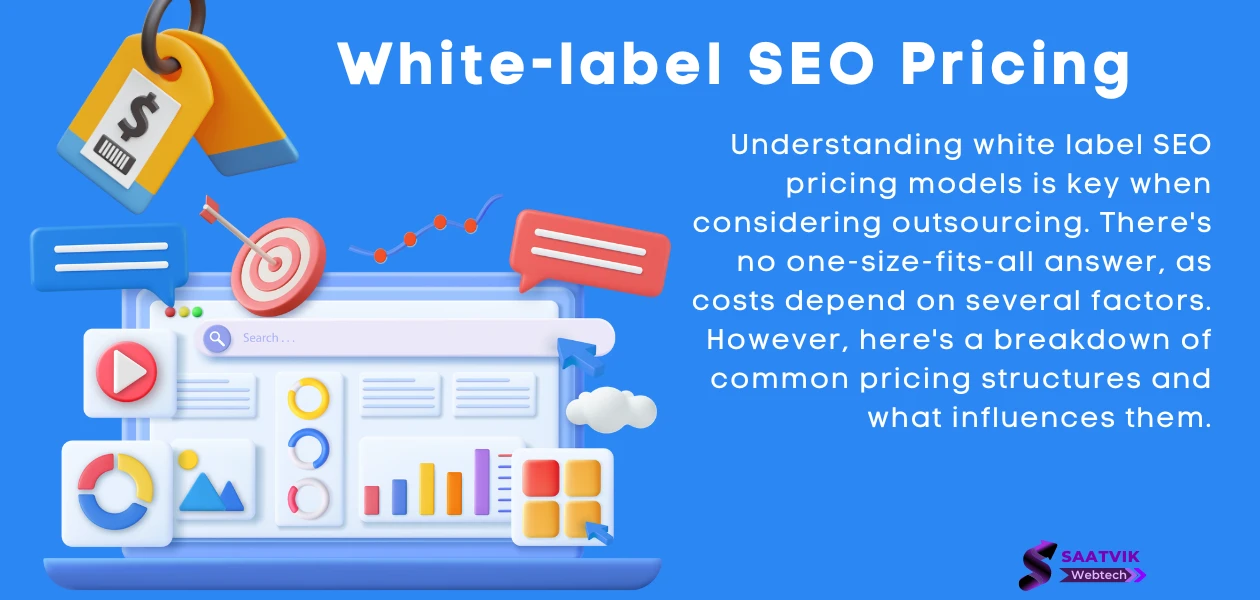 White-label SEO Pricing
White-label SEO Pricing
Understanding white label SEO pricing models is key when considering outsourcing. There’s no one-size-fits-all answer, as costs depend on several factors. However, here’s a breakdown of common pricing structures and what influences them.
Typical Pricing Models
- Monthly Retainers: The most common model. You pay a fixed monthly fee for a predetermined set of SEO services. This provides budget predictability and consistent SEO work.
- Hourly Rates: Best for smaller projects or consultations. You pay for the actual hours spent on your SEO work. This offers flexibility if your needs are less consistent.
- Project-Based Pricing: You pay a set amount for a specific project, like a website audit or a backlink campaign. A good option for well-defined, one-time tasks.
- Performance-Based Pricing: This model ties a portion of the fee to results, like achieving certain keyword rankings. It’s higher risk for the provider, so prices may be higher upfront.
Factors Influencing White Label SEO Pricing
- Scope of Services: More comprehensive SEO packages (extensive keyword research, content creation, link building, etc.) naturally cost more than basic services.
- Size and Complexity of Website: Optimizing a large, complex website requires more time and resources, thus impacting the price.
- Competition in Your Industry: Highly competitive niches demand more aggressive SEO strategies, which may translate into higher costs.
- Provider’s Experience and Reputation: Proven white-label SEO companies often charge a premium for their expertise.
- Location: Providers in areas with higher costs of living will likely have higher price points.
How to Get Value for Money
- Transparency: Choose providers with clear pricing breakdowns, so you know what you’re paying for.
- Scalability: Ensure the pricing model can grow with your needs, avoiding restrictive packages.
- Customizable: Ideally, you can tailor the services to fit your budget and goals.
- Reporting: Regular, understandable reports are crucial to justifying the investment to your clients.
Beyond the Price Tag
Remember, the cheapest SEO isn’t always the best. Prioritize long-term value—consider the provider’s track record, communication style, and commitment to ethical SEO practices.
Ready to supercharge your online growth?
Tired of missing out on potential clients because your SEO isn’t up to par? Frustrated by the time and cost of building an expert in-house team? White-label SEO is your answer. Partner with us to transform your online presence and leave your competitors behind.
- Gain SEO expertise without the hiring headaches: Tap into a team of SEO specialists instantly.
- Scale your services effortlessly. Handle more clients and bigger projects without overwhelming your staff.
- Boost your bottom line: Offer in-demand SEO services that increase client value and your revenue.
Conclusion
White Label SEO: A Smart Solution for Growth-Focused Businesses
White-label SEO has emerged as a game-changer, particularly for agencies and businesses aiming to conquer the ever-changing world of search engines. It empowers you to offer top-notch SEO services without the burden of building an in-house team, saving you time, money, and resources.
Let’s recap why white-label SEO deserves serious consideration:
- Expertise on Tap: You instantly gain access to SEO experts who stay ahead of Google’s algorithm updates and know the best strategies.
- Scalability Made Easy: Whether you need to handle a sudden influx of clients or expand into new markets, your white-label partner scales with you.
- Cost-effectiveness: Compared to hiring and training your own SEO team, white-label solutions are often surprisingly affordable.
- Focus on What Matters: Free yourself to excel at your core business strengths while the SEO side of things is expertly handled.
- Your brand shines. White-label SEO lets you build a stronger brand reputation by seamlessly offering in-demand services under your own name.
Should you take the leap?
If you’re an agency looking to grow a client base and expand service offerings, or a business needing to boost your online presence without breaking the bank, exploring white-label SEO is a wise move. The right partner can propel your success in the digital landscape. Remember, choosing a reputable and experienced provider is key, so carefully consider the factors we’ve discussed throughout this guide.
White label SEO isn’t a magic bullet, but when strategically implemented, it’s a powerful tool for unlocking sustained online growth. Are you ready to see what it can do for your business?
FAQ: White Label SEO Demystified
1: I’m not an SEO expert. Can I still benefit from using white-label SEO?
- Answer: Absolutely! One of the greatest advantages of white-label SEO is that you don’t need prior SEO knowledge. Your partner handles the technical aspects so you can focus on client relationships and growing your business.
2: I’m a small agency. Is white-label SEO too expensive for me?
- Answer: Not necessarily. White-label SEO providers often offer scalable pricing models, from smaller packages to larger ones. This makes it accessible to agencies of different sizes. Plus, it saves you the expense of hiring and training in-house SEO staff.
3: Won’t my clients know I’m outsourcing their SEO?
- Answer: No! That’s the beauty of white-label SEO. All work is delivered to you, fully branded as your own. Your clients see you as an SEO expert, strengthening your relationship with them.
4: How do I make sure a white-label provider aligns with my niche/client needs?
- Answer: During your search, ask providers about their areas of specialization. Look for those with experience in industries similar to your client base. Also, inquire about the initial audit process; a good provider will thoroughly analyze your clients’ websites and competitors.
5: What kind of results can I realistically expect from white-label SEO?
- Answer: Results vary based on your niche, starting point, and goals. However, expect improvements in search engine rankings, website traffic, and online lead generation. A reputable provider will provide clear reporting, so you can demonstrate ROI to your clients.
